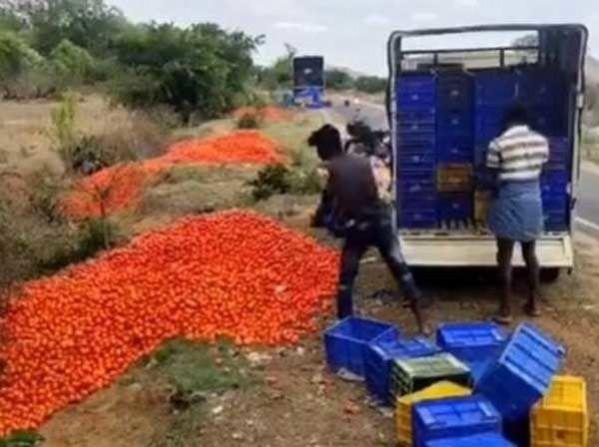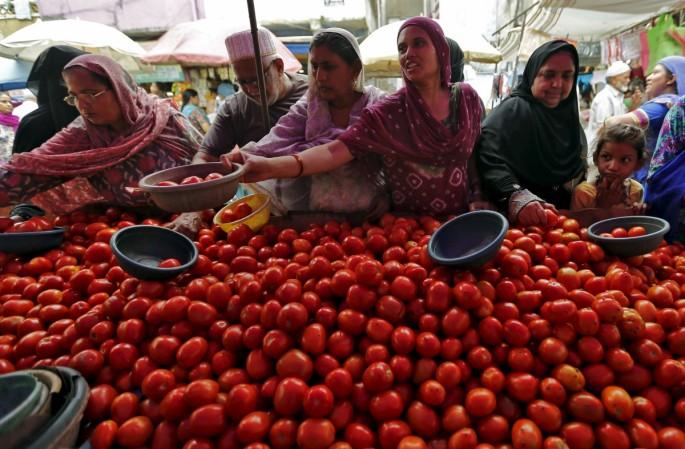On Thursday, May 20, a viral video shared by a Twitter user showed two farmers emptying crates after crates of ripe tomatoes on the roadside at Kolar in Karnataka. The video that received much attention triggered many reactions on the microblogging site. According to Imran Khan who uploaded the video, the farmers were forced to dispose of the tomatoes out of sheer frustration as they were offered a mere Rs 2 per kg per 15kg crate.
International Business Times spoke to farmers from Karnataka to find out how the lockdown has affected agriculture in the state and why farmers resort to such an extreme step.
Sunil, a local vendor who purchases fresh produce every morning from KR Market to sell it to residents shares, "In Kolar, farmers are getting 30 Rs for a crate but at KR market, it is being sold at 150 Rs per crate." A crate equals 15 kgs of tomatoes explains Sunil who charges 10 Rs for selling a kilogram.

Middlemen problem
Manjunath Holalu, a representative of the Karnataka Young Farmers' Association (KOFA) agrees that there is a huge gap between the farmers' price and market price owing to the middlemen. "Exploitation by middlemen has always been prevalent, lockdown or not. However, now due to the lockdown, the quantum of purchase from major buyers such as restaurants/hotels has come down drastically. This is the season for tomatoes especially in the Kolar region, and since there is a limited purchase, farmers have taken such an extreme step of throwing away the excess out of frustration."
Even though there are no transport restrictions on paper during the COVID-19 lockdown, it's not as easy for farmers to bring the harvest to the big city. Highlighting a recent incident faced by some farmers, Manjunath shares, "About 5-6 days back, some farmers were taking their produce from Ramnagara to Bangalore, and road officials stopped them from doing so. They wanted a few crates for themselves for letting them go."
According to him, it's not just tomato farmers who may be impacted, but growers of flowers, onions, garlic, brinjal, mangoes too.
Sustainable farming is the need of the hour
Ramesh Babu Reddy of Kolar Farmer's Co-op society explains that farmers who are ignorant are to be blamed for their plight, "March to August is tomato season in Kolar which is the biggest producer and supplier of tomatoes in Asia. Currently, due to the lockdown-like restrictions, there are no big events such as marriage functions; hotels and restaurants are not demanding much supply and that's why so much stock is going to waste. If you are to visit APMC (Agricultural Produce Market Committee) yard in Kolar, you will see 1000 tons of tomatoes rotting every day."
He adds that tomatoes are a highly perishable crop and if not used in time, will be spoilt. The farmers here need to find other means to sustain themselves. "It takes 90 days to grow and harvest tomatoes and then in the next two months, they have to be disposed of. So it's a five-month crop cycle. Why can't the farmers grow other sustainable crops such as millets which have a higher storage period and can get them a decent price?"

As a practicing organic farmer, he feels that government needs to interfere to help the farmers in such situations and suggests that processing units can be set up to ensure the stock is turned into ketchup or pickle to extend its life. "Government needs to untrain the farmers, convince them to grow organic produce which can be supplied to more markets which welcome pesticide-free food, explore intercropping and work on sustainable farming methods rather than growing only commercial crops."
Last year in September, Kolar tomato growers were in for a rather pleasant surprise as post lifting of the first wave lockdown, their produce found profitable export markets in bordering countries. According to a New Indian Express report from September 2020, "Before the pandemic and subsequent lockdown disrupted international trade, tomato growers in Kolar exported their produce to Bangladesh, Pakistan, Afghanistan, and China. With travel restrictions eased after the lockdown was lifted, exports to Bangladesh have resumed. Each day for the past few weeks, lorries laden with 400 tonnes of tomatoes have been making their way to the neighbouring country."
The report that quoted the APMC market supervisor also stated that post-lockdown, "the price of a 15 kg box of tomatoes, which fell to Rs 50, crossed Rs 600. Two days ago, it touched Rs 800 in auctions."
Certainly, it is the high saleability of this seasonal crop that lures Kolar farmers to grow tomatoes. However, in a global pandemic situation with lockdowns imposed to curb the spread of Covid-19, the risk of loss is higher.

Not a new trend
In 2017, The Hindu reported a similar incident where farmers were seen dumping their tomato yield by the roadside. Lockdown or not, it seems like this is a common practice for farmers here during this time of the year. The report titled 'Kolar farmers dump tomatoes on roads as prices crash' dated May 1, 2017, revealed, "The lack of standardization in prices is also cause for concern... Price variations are forcing farmers to leave tomatoes to rot in the field. Dumping of tomato on the roadside has become a common scene in the district."
And such is the state of not just local farmers but also those abroad.
According to a Bloomberg report released in April 2020, "Food waste is taking on a new meaning in the pandemic era. Dumped milk in Wisconsin. Smashed eggs in Nigeria. Rotting grapes in India. Buried hogs in Minnesota... disturbing images have stirred outrage around the world. But here's the surprising part: the world may not actually be wasting more than normal when a third of global food production ends up in landfills."
Time for change
However, there is hope and also scope for change. Manjunath and his team at KOFA have started initiatives for farmers during the lockdown to support them. This includes helping them initiate an online platform to sell. Surendra N R, a mango grower from Ramnagara district told IBTimes. "We are using technology to spread the word about our mangoes and opting for direct delivery to customers."









!['Had denied Housefull franchise as they wanted me to wear a bikini': Tia Bajpai on turning down bold scripts [Exclusive]](https://data1.ibtimes.co.in/en/full/806605/had-denied-housefull-franchise-they-wanted-me-wear-bikini-tia-bajpai-turning-down-bold.png?w=220&h=138)



